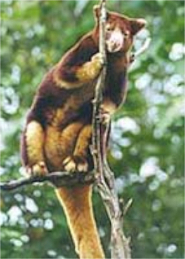 The Doria's tree-kangaroo (Dendrolagus dorianus) is an unusual animal. It is a tree-dwelling kangaroo that can actually hop from tree to tree. The common name for these unique animals is Doria’s Tree Kangaroo. They are relatively rare as they are only found in the mountainous areas of southern New Guinea (Indonesia) and southern Papua New Guinea. On the red list of endangered species, Doria’s Tree Kangaroo is listed as "Vulnerable."
The Doria's tree-kangaroo (Dendrolagus dorianus) is an unusual animal. It is a tree-dwelling kangaroo that can actually hop from tree to tree. The common name for these unique animals is Doria’s Tree Kangaroo. They are relatively rare as they are only found in the mountainous areas of southern New Guinea (Indonesia) and southern Papua New Guinea. On the red list of endangered species, Doria’s Tree Kangaroo is listed as "Vulnerable."Doria’s Tree Kangaroo is one of the largest of the tree kangaroos. They are nocturnal and spend most of the time as solitary individuals. It has a bear-like face and a stocky build. The weight of this species ranges from 6.5 to 14.5 kg (14.3-32 lbs). The body is 51-78 cm (20-31 inches) in length, with a long tail of 44-66 cm (17.3-26 inches). The fur of the Doria’s Tree Kangaroo is dark brown on the body, tan on the tail and under-body, and black on the ears. The tail is thick and is used for balance when climbing. The fur is rather long and grows backward on the neck and the back, which is thought to make those areas waterproof. Tree kangaroos are related to the Australian kangaroos, even though their appearance is quite different. The Doria’s Tree Kangaroo has large paws with long curved claws to aid in climbing.
The gestation period is 32 days, and only one baby is born. As with many marsupials, the baby is born undeveloped and must crawl into the mother’s pouch. The joey will nurse in the mother’s pouch for 300 days; however, they are not completely weaned until 600 days.
Keywords: nocturnal , tail , brown , black , claw , pouch
The Doria's tree kangaroo, unicolored tree kangaroo is listed as Vulnerable (VU), considered to be facing a high risk of extinction in the wild, on the IUCN Red List of Threatened Species
Namings for the Doria
A young / baby of a Doria is called a 'joey'. The females are called 'flyer or doe' and males 'boomer or buck'. A Doria group is called a 'mob, troop or court'.Some facts about the
Doria's tree kangaroo
Adult weight : 9.581 kg (21.0782 lbs)
Maximum longevity : 19 years
Weaning : 600 days
Litter size : 1

Custom Search